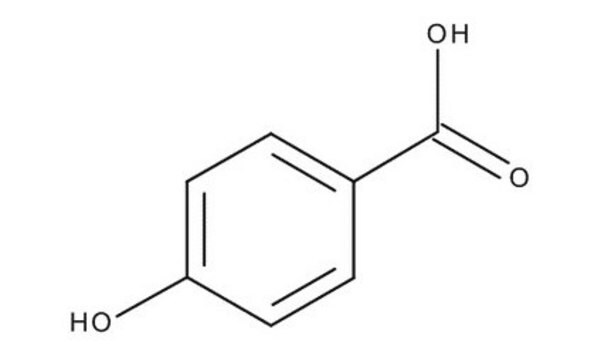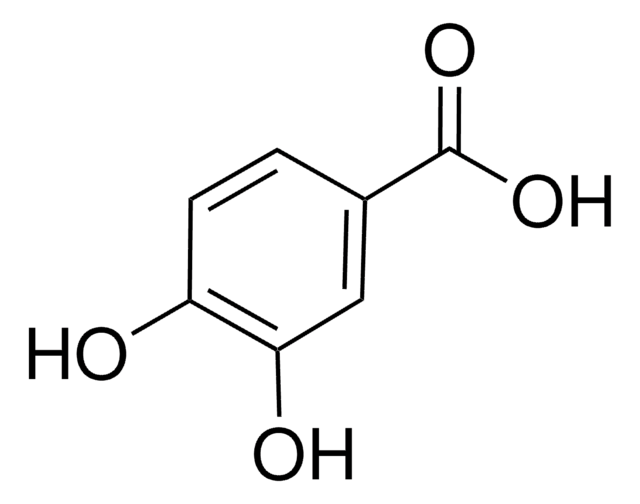240141
4-Hydroxybenzoic acid
ReagentPlus®, ≥99%
Synonym(s):
4-Carboxyphenol, 4-Hydroxybenzoic acid, Paraben-acid, p-Carboxyphenol, p-Hydroxybenzoic acid, p-Hydroxyl benzoic acid, p-Salicylic acid
About This Item
Recommended Products
Quality Level
product line
ReagentPlus®
Assay
≥99%
form
powder
mp
213-217 °C (lit.)
solubility
water: soluble 125 part(lit.)
acetone: soluble(lit.)
alcohol: freely soluble(lit.)
carbon disulfide: insoluble(lit.)
chloroform: slightly soluble(lit.)
diethyl ether: soluble(lit.)
functional group
carboxylic acid
SMILES string
OC(=O)c1ccc(O)cc1
InChI
1S/C7H6O3/c8-6-3-1-5(2-4-6)7(9)10/h1-4,8H,(H,9,10)
InChI key
FJKROLUGYXJWQN-UHFFFAOYSA-N
Looking for similar products? Visit Product Comparison Guide
Related Categories
General description
Application
- Monoesters via esterification with sucrose.
- Thermotropic liquid crystalline polymers.
- 4-Hydroxybenzaldoxime via one-pot chemoenzymatic method.
Legal Information
Not finding the right product?
Try our Product Selector Tool.
Signal Word
Danger
Hazard Statements
Precautionary Statements
Hazard Classifications
Eye Dam. 1 - STOT SE 3
Target Organs
Respiratory system
Storage Class Code
11 - Combustible Solids
WGK
WGK 1
Flash Point(F)
Not applicable
Flash Point(C)
Not applicable
Personal Protective Equipment
Regulatory Listings
Regulatory Listings are mainly provided for chemical products. Only limited information can be provided here for non-chemical products. No entry means none of the components are listed. It is the user’s obligation to ensure the safe and legal use of the product.
JAN Code
240141-VAR:
240141-50G:
240141-BULK:
Choose from one of the most recent versions:
Certificates of Analysis (COA)
Don't see the Right Version?
If you require a particular version, you can look up a specific certificate by the Lot or Batch number.
Already Own This Product?
Find documentation for the products that you have recently purchased in the Document Library.
Customers Also Viewed
Our team of scientists has experience in all areas of research including Life Science, Material Science, Chemical Synthesis, Chromatography, Analytical and many others.
Contact Technical Service










